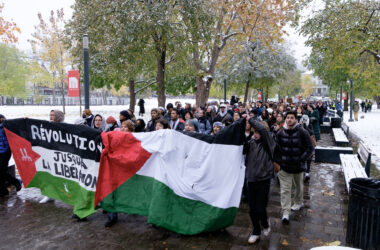
You know a Montreal news story has blown its lid when it appears in your hometown newspaper in Vermont. That’s been the case with the recent incident at University of Montreal, when business students dressed up in blackface for a back-to-school event, mocked the Jamaican patois language, and chanted about marijuana. A complaint with the Quebec Human Rights Commission was promptly filed, shocking no one. The incisive media scrutiny has unearthed a cruder side to university rituals and pageantry. The more pressing question has not been asked: what mechanisms will prevent such incidents in the future?
McGill professor Charmaine Nelson wrote an eloquent commentary in The Gazette profiling both the profanity of the frosh event and the history of blackface minstrelsy. The event, Nelson reminds us, “should alert us to the fact racism is alive and well in Canada.” Blackface became popular in 19th century minstrel and vaudeville shows, with white actors caricaturing black stereotypes using face paint. These days, ill-informed incidents of it pop up every now and again, and its distasteful nature is seldom seriously denied. A few years ago, an episode of the TV show It’s Always Sunny In Philadelphia focused exclusively on the question: is blackface racist? The characters farcically debated the issue, then completed the parody by making a blackface movie so far beyond reality that it was elevated to the realm of absolute absurdity. They reached the conclusion that there is nothing subjective about such racism. If dissected skeptically, blackface is racist. If enacted through ignorance, it’s still racist.
When the smoke clears, the racism is obvious and the solution is not. The incident did not arise out of direct malice toward Jamaicans or African-Canadians, but out of a revelry in which rules supposedly go out the window. And in this type of scenario, similar to those that occur during frosh, the student leaders needed to be more vigilant, and use the judgment granted to them in that position. If that responsibility is exercised at the time, then the inane hoopla over how to punish the “perpetrators” wouldn’t be necessary.
The UdeM administration has promised that those involved will take mandatory classes on cultural sensitivity (an option which will soon be available to the entire student body). Nelson asks, perhaps rhetorically, whether the students should be expelled, lose a semester, or perform community service. These options range from outrageously drastic to respectable, but they miss the point altogether: peer leaders have the power to stop undue profanity on the ground, in the moment.
Debacles over university rituals have arisen and receded. Over the last year, university administrations have sought to curb frosh through strict rules, and outside observers have blown the whistle on real or potential scandals (as was the case last year when McGill management’s brilliant idea, “Tribal Frosh,” was cancelled at the last minute). But these criticisms from afar only serve to stave off scandal or punish it after the fact. Drunken ideas such as gallivanting around in blackface don’t take into account university regulations, and their enactors don’t have the foresight to know the consequences. But they will listen to their peers.
Some will read this as an attack on university events. It’s not at all. I enjoyed the debauchery as much as anyone. But leaders can direct this energy toward its rightful place —socializing and kicking off a university career worth remembering. Outrageous drunken fun and outrageous profanity don’t have to get in bed together, and it is the leaders’ responsibility to keep the balance.








